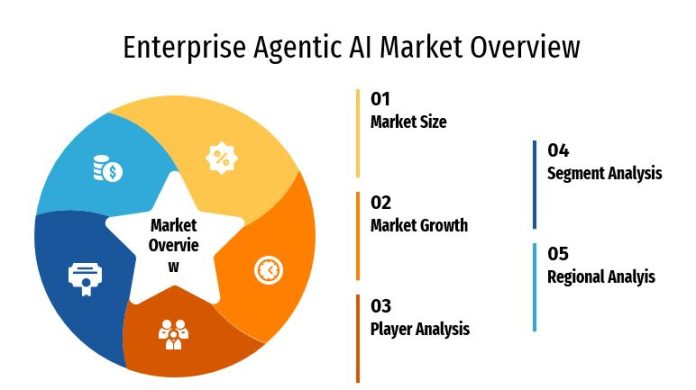Enterprise Agentic AI refers to advanced artificial intelligence systems designed as autonomous agents capable of perceiving their environment, reasoning, making decisions, and taking actions to achieve specific goals with minimal human intervention. Unlike traditional AI models that rely on static prompts or pre-set workflows, agentic AI can dynamically adapt, learn from interactions, and execute multi-step tasks across diverse enterprise processes. These intelligent agents integrate seamlessly into business ecosystems, enabling adaptive operations, faster decision-making, and greater operational resilience.
In the enterprise landscape, agentic AI finds application across multiple domains, including process automation, customer service, IT operations, supply chain optimization, risk assessment, cybersecurity, and financial management. It enables organizations to orchestrate complex workflows, respond to changing market or operational conditions in real time, and deliver hyper-personalized customer experiences. By acting as autonomous co-pilots, these agents enhance productivity, improve decision accuracy, and reduce operational costs, making them increasingly relevant in sectors such as banking, retail, healthcare, manufacturing, and technology services.
Recent Developments and Their Impact
IBM – Agentic AI Innovation Center in Bengaluru
In 2025, IBM inaugurated its Agentic AI Innovation Center in Bengaluru, a state-of-the-art facility aimed at helping enterprises, startups, partners, and developers experience and co-create with autonomous, intelligent AI agents. This initiative is expected to accelerate innovation by providing a collaborative environment where organizations can test and refine AI agent use cases, ultimately lowering the barriers to enterprise adoption.
Kyndryl – Enterprise Agentic AI Framework
In 2025, Kyndryl introduced a new Agentic AI Framework designed to help businesses deploy AI agents that support human teams and adapt to changing environments. By enabling deployment across cloud, on-premises, and hybrid systems, this framework offers enterprises a scalable, future-proof approach to integrating adaptive AI into existing infrastructure without major disruptions.
Intuit – AI Agents in Enterprise Suite
In 2025, QuickBooks maker Intuit added artificial intelligence agents to its Enterprise Suite as part of a broader expansion of automation and financial management capabilities for mid-market companies. This move demonstrates the growing role of agentic AI in streamlining financial operations, improving accuracy, and freeing up human resources for higher-value tasks.
Cequence Security – AI Gateway for Secure AI Integration
In 2025, Cequence Security launched the Cequence AI Gateway, a solution enabling enterprises to harness the productivity gains of agentic AI while maintaining security and compliance. By bridging AI agents with enterprise applications and embedding guardrails, the AI Gateway addresses critical adoption concerns around trust, control, and risk mitigation.
Cognizant – Agent Foundry for Large-Scale Deployment
In 2025, Cognizant announced the launch of Cognizant Agent Foundry, an offering designed to help enterprises design, deploy, and orchestrate autonomous AI agents at scale. With a combination of frameworks, reusable assets, and implementation services, it supports continuous, agent-driven transformation, enabling adaptive operations, real-time decision-making, and personalized customer experiences across workflows.
Future Outlook
The enterprise agentic AI sector is poised for rapid expansion as organizations seek autonomous, adaptive systems capable of operating in dynamic environments. As standardized frameworks, secure integration platforms, and domain-specific applications mature, adoption is expected to spread beyond early innovators to mainstream industries. Integration with generative AI, IoT, and edge computing will unlock powerful new capabilities such as self-optimizing supply chains, proactive risk management, and intelligent customer engagement systems. Businesses that strategically embed agentic AI into their core processes stand to gain a decisive competitive advantage in efficiency, agility, and innovation.


